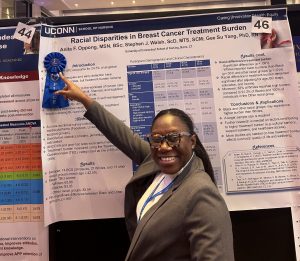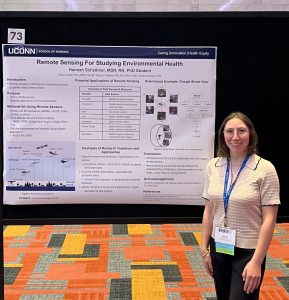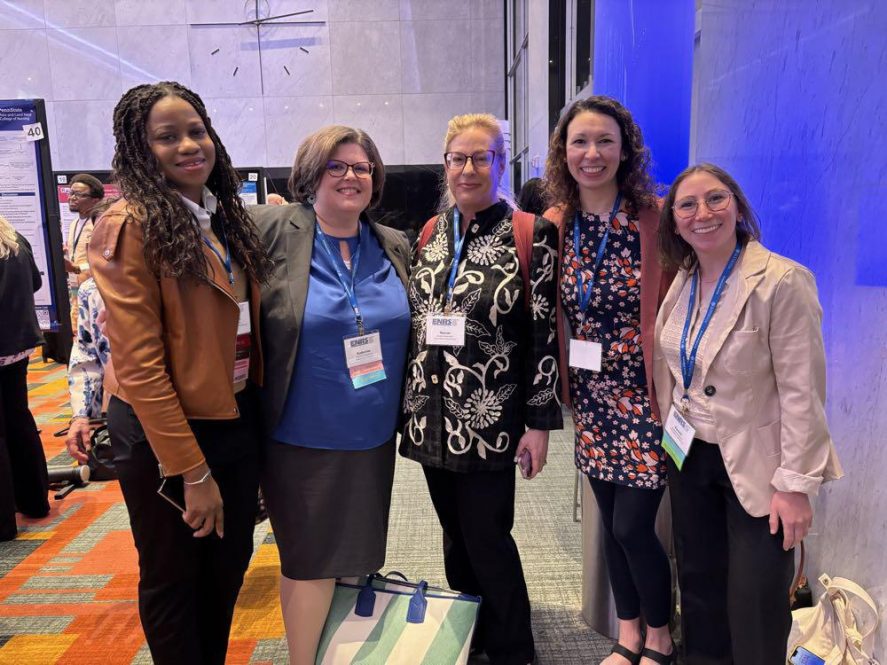Still celebrating her win for her poster titled “Racial Disparities in Breast Cancer Treatment Burden”, Anita Oppong MSN, RN, a second year PhD student, said the Eastern Nursing Research Society (ENRS) conference was more than just a competition, but also a place to expand her research.
ENRS is comprised of nurses and other individuals interested in nursing research. Established in 1988, the society has continued to advance and promote health through “innovative nursing science,” according to the ENRS website.
This was their 37th annual conference held in Philadelphia, PA from April 3-4. The theme of this year’s session was “Freedom to Advance Health and Well-Being Through Revolutionary Nursing Research Partnerships.”
The conference features research symposiums, poster sessions, exhibitors, a member luncheon, and an award ceremony, giving attendees an action-packed experience.

At the conference “we learn every day,” Oppong said. “It helps to build your thinking capacity in terms of research.”
By attending presentations and seeing the work of her peers, she said it helped develop her own program of research.
“It gives me questions to ask myself. Questions to search for,” Oppong said.
Louise Reagan, PhD, APRN, ANP-BC, FAANP, FAAN, is an associate professor and director for the PhD program at UConn as well as an ENRS board member.
She said this year’s conference had the largest number of attendees with about 780 people.
“The ENRS conference really brings people together and shows what good work we’re doing and the research that can be life changing for our patients and improve healthcare,” Reagan said.
Deborah Chyun, PhD, RN, FAHA, FAAN, said ENRS is “a gathering place for all of us in the eastern corridor.” She shared similar remarks as Reagan, saying it’s a great opportunity to show off the work UConn School of Nursing students and faculty have done.
Chyun said it’s a good forum to catch up with people throughout the region and it serves as an important recruitment opportunity for both faculty and students, whether it’s a masters, DNP, PhD, or post-doctoral student.
“The thing about ENRS is it’s very broad, it covers all,” Chyun says. “So, you have a lot of different topics, but that’s good because it allows you to see what else is going on outside the tunnel of your own specialty area.”
With the conference encompassing a wide range of nursing research and professionals, Oppong’s win was an important moment for UConn.
Being handed the certificate was a joyful experience for her and one that she will never forget. “It was an honor,” she said.
Connecting and Networking
ENRS provides attendees with a space to connect with like-minded individuals creating an environment for networking. This was a major highlight for third year PhD student Hannah Scheibner, MSN, RN who said it was a great opportunity to meet people with similar interests.
Like Oppong, Scheibner specifically recounted the poster sessions and how much insight she gained within her own work and others.

“The poster sessions are great to just see the wide scope and breadth of work that’s being done all across the Northeast,” she said. “It’s great getting feedback and engaging in discussions with people, especially when I have my poster presentation.”
Scheibner’s poster – “Remote Sensing and Applications for Studying Environmental Health Inequities in Nursing Science” – showed how nurses can use sensors to measure health related environmental characteristics without coming in direct contact with said environment.
“You can measure so many various factors that are related to environmental health that impact the patients that we care for,” said Scheibner. “It’s very accessible for nurses to harness in their research. They don’t need to go out in the field and learn how to use all this equipment.”
Scheibner said the poster session was really encouraging with enthusiasm and support coming from other attendees.
Christina Ross, PhD, RN, an assistant professor in the School of Nursing also emphasized the networking opportunities she received from the conference. She was able to connect with others who had similar research as hers, ultimately expanding her own work.
“I really enjoyed the conference because there were a lot of nurse scientists who presented work on adolescents’ sexual and reproductive health on both a local and global scale,” she said. “I was able to connect and discuss my research which was similar to theirs but in the US context.”
Tyler Driscoll, another third year PhD student at UConn said “The ENRS Conference is a great place to learn, contribute, gain experience, and network with the top nursing scientists in the region.”
Driscoll’s poster was on psychological pathogen avoidance mechanisms and how they work in modern ecologies.
“Whether you are presenting a poster and getting feedback and insights from a more senior researcher or participating as a peer audience member during a scientific presentation, the opportunity to learn something new about anything—from genetics, to school nursing, to post-partum depression, to breast cancer—or even about yourself and your own journey—is always there,” he said.



